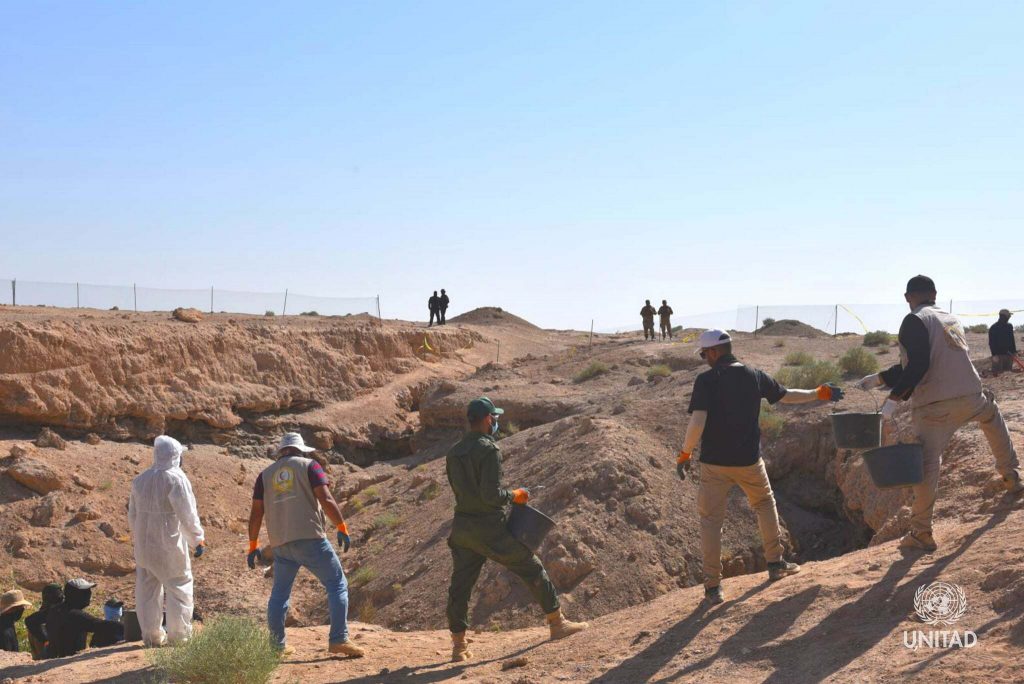
On the 30th November 2021, a former ISIL Fighter and his wife were convicted by a Frankfurt court in Germany for genocide and crimes against humanity under the German “Völkerstrafgesetzbuch” (German International Criminal Code) in a landmark trial based on universal jurisdiction. A significant part of the indictment in the Taha al-J. – case focused on a Yazidi girl who was purchased as a slave and whom the couple let die of thirst outside their house in Fallujah, Iraq in 2015. Overall, the genocidal acts against the Yazidi minority resulted in more than 5000 violent deaths according to the latest estimates by the UN. Other well documented atrocities committed by ISIL included the repeated deployment of chemical weapons against civilians, and mass killings of Shia, Christian, Kaka’i, Turkmen and Shabak minorities.
When delegates of the Austrian People’s Party (ÖVP) and the Greens signed the coalition agreement in 2020, they agreed, among other things, on the issue of creating an international tribunal for members of ISIL. Three years later, the prospects of a centralized tribunal seem to have dwindled[1], while an increased number of states opened independent investigations against ISIL suspects. While hundreds of high-level perpetrators were trialed relatively swiftly in Iraq, only few of them have enjoyed adequate due process rights and fair legal proceedings.
Governments of EU member states, and UN officials alike, opposed the possibility of the death penalty for suspects in Iraq and raised their concerns with members of the Iraqi government. The International Criminal Court (ICC) in the Hague lacked jurisdiction over Syria and Iraq[2] and hence the prosecutors were not able to launch a preliminary investigation. Prospects of fair trials in Syria are even more far-fetched in the current situation and given the dim outlook for substantial political changes in Damascus. Finally, many European governments[3] were hesitant to repatriate or transfer its Foreign Terrorist Fighters from the camps of Al-Hol and Roj in northern Syria to their home countries. For the time being, all of these factors have resulted in an impasse on the subject, and no centralized international tribunal has been established.
In 2016 the United Nations Security Council established an international framework to gather evidence on the ground in Iraq and to assist in the prosecution of suspected ISIL members around the world. The UN Investigative Team to Promote Accountability for Da’esh Crimes, or UNITAD, is situated in Baghdad and has been since recently led by Christian Ritscher, a former German prosecutor. Unfortunately, UNITAD’s mandate is limited to Iraq’s territory and does not extend to Syria. This rationale is contradicted by the reality that ISIL territory plainly encompassed regions of both governments, but the issue was not settled due to political infighting over the mission’s authority.
So far, UNITAD has taken a survivor-centered approach, dispatching multiple field missions to collect DNA samples from mass graves in Nineveh and other governorates in the north and west of Iraq. The teams consist of Journalists, lawyers, and psychologists, who have concentrated on investigating violent acts targeting ethnic minorities such as the Yazidi and other incidents. Hundreds of graves have already been excavated and scanned with laser instruments in order to provide solid evidence for trials. Collected evidence has also been digitized to make it easier for prosecutors all over the world to request mutual legal help.
Furthermore, acts of sexual and gender-based violence are examined with particular attention and by specialized investigation teams. As a result, an all-female team of psychologists and legal specialists was formed to conduct interviews with victims of such crimes. Prosecutors in Frankfurt utilized similar evidence in their recent successful conviction of the first ISIL militant who had been charged with genocide.
The lack of financial resources, seconded staff and political support of the mission has been scarce from its outset. In 2019 the UN mission only had a budget of 19,5 Mio USD and struggled to gain additional funding. Nevertheless, Germany, also delivered support by “seconding an expert to the team, as well as by providing financial assistance to the partner organization International Commission on Missing Persons”. Moreover, Germany provided technical equipment for the studies and contributed a significant portion of UNITAD’s funding as one of the major donors. Furthermore, information such as meta data provided to UNITAD by cellular providers has been successfully utilized to prosecute repatriated foreign terrorist fighters in Europe on multiple occasions.
Against this backdrop, the Austrian government should finally fulfill its 2020 obligations since it has chosen to devote funding and resources to the creation of a special tribunal for ISIL members. While a centralized tribunal is unlikely to be established in the near future, due to the above outlined factors, Austria should contribute financially and with expertise to UNITAD’s activities in Iraq. Furthermore, Austria should support the critical work of civil society organizations in Iraq in gathering and archiving evidence, as this evidence can be admitted formally to international procedures, too.[4]
History has shown that Austria is capable of doing this. After the horrifying conflicts in the Balkans in the 1990s, Austria was able to provide expertise and seconded judges to the International Criminal Tribunal for the former Yugoslavia (ICTY). Moreover, Austria dispatched prosecutors and investigators to Kosovo for onsite investigations.
The recent case of the Syrian Arab Army General Khaled al-Halabi has exposed the legal barriers and the lack of political will in Austria to prosecute individuals on the grounds of universal jurisdiction.[5] Nevertheless, there are a number of steps that the Austrian government could follow to assist the victims of ISIL’s atrocities to maintain Austria’s position as a supporter of international criminal justice. It must support the innovative mechanism that provides at least some justice to the victims of grave violations of international humanitarian law, war crimes and genocide in Syria and Iraq.
So far, it is still realistic that the Austrian government decides to contribute financially. While it is already funding a similar mechanism that is investigating atrocities conducted by ISIL and the Syrian government in Syria, it should specifically address the Yazidi genocide and support UNITAD, too.
[1] While there were several attempts by other governments, for instance one initiative by Sweden, Germany and the Netherlands, none have proceeded to a more elaborate stage. See: Swedish Ministry of Justice (2019) ‘Sweden has hosted an expert meeting on the tribunal’. https://www.regeringen.se/pressmeddelanden/2019/06/sverige-har-statt-vard-for-expertmote-om-tribunal/ (8.12.2021).
[2] Iraq and Syria are not State parties to the Rome Statute of the International Criminal Court. See: https://asp.icc-pi.int/en_menus/asp/states%20parties/pages/the%20states%20parties%20to%20the%20rome%20statute.aspx (8.12.2021).
[3] For example, the United Kingdom, Ireland. Occasionally Belgium and the Netherlands. See also: Maarten P. Bolhuis & Joris van Wijk (2020) ‘Citizenship Deprivation as a Counterterrorism Measure in Europe; Possible Follow-Up Scenarios, Human Rights Infringements and the Effect on Counterterrorism’, European Journal of Migration and Law 22 (2020) p.338–365. https://brill.com/view/journals/emil/22/3/article-p338_2.xml?language=en (8.12.2021).
[4] See: ‘The Prosecutor v. Jean-Pierre Bemba Gombo’ (ICC-01/05-01/08-2138), Trial Chamber 2013. “Decision on the Prosecution’s Application for Admission of Materials into Evidence Pursuant to Article 64(9) of the Rome Statute”, (ICC-01/05-01/08-2299), Para 22. https://www.icc-cpi.int/CourtRecords/CR2013_04725.PDF (8.12.2021).
[5] Khaled al-Halabi is a Syrian General who headed Branch 335 of the Syrian General Intelligence Directorate in Raqqa from 2009 until 2013. He defected and subsequently fled to Europe via Jordan and was granted Asylum in Austria. Prosecutors opened an initial investigation in 2015 that was closed although French authorities issued a request on Al-Halabi via Europol regarding substantiated allegations of crimes against humanity and war crimes.
Gabriel Hartmann studied Oriental and Arabic Studies at the Department of Near Eastern Studies in Vienna and is currently completing a Master’s in Arab World Studies. He is particularly interested in politics and journalism in the Middle East with a focus on Iraq.
Julius Seidenader Co-President of Ponto studied history and political science in Vienna as well as EU and international law in Leiden. He specialized on sanctions policy, armed conflicts, and the Middle East. In his free time, he is often climbing and ski touring in the mountains.
Picture: UNITAD 2019, Open commons
